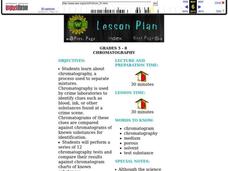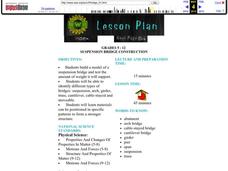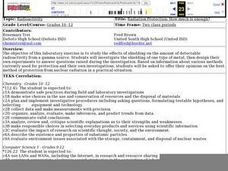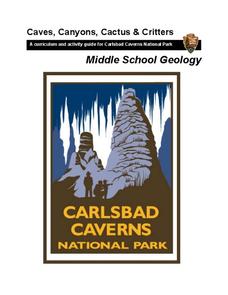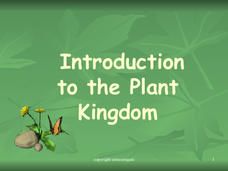Curated OER
The High Plains: Land of Extremes
Students complete activities surrounding the study of groundwater movement, energy resources, wind energy, and riparian areas. They debate/role-play the viewpoints of different interest groups in considering whether the black-footed...
Curated OER
Big Fat, Juicy Worms
Students collect and study information about worms. They discover how an earthworm helps process and loosen the soil. They write in their journals as well.
Curated OER
Global Change- Time and Cycles
Young scholars study trees and their growth. In this investigative instructional activity students work in groups to reconstruct a 50 year climatic history using a simulated tree ring.
Curated OER
How is Rice Harvested?
Second graders look at how rice is harvested. For this rice harvesting lesson, 2nd graders learn vocabulary associated with rice harvesting. They read or listen to a study guide before making Squishy Rice Balls from balloons and rice.
Curated OER
Chromatography
Learners study about chromatography, a process used to separate mixtures.
Curated OER
Suspension Bridge Construction
Students study types, strength and construction of a variety of bridges. They build a model bridge and test the amount of weight it support.
Curated OER
Sense Of Place
Students study ecology, listen to speakers and research conservation topics. In this investigative lesson students discuss wilderness resources, learn about Native Americans and participate in activities that help them to better...
Curated OER
RADIATION PROTECTION: HOW MUCH IS ENOUGH?
Students study the effects of shielding on the amount of detectable radioactivity from a gamma source. They investigate the shielding of one type of metal, then design their own experiments to answer questions raised during the...
Curated OER
What's Up? Astronomy Curriculum
Students study astronomy. In preparation for a field trip to a planetarium, students discuss the stars, planets, and light. They explore the importance of the north star and constellations. The Digitarium system is used to assist the...
Curated OER
Growing Stages of a Rice Plant
Third graders make a chart to compare the growth of a wheat plant verses the growth of a rice plant. In this planting lesson plan, 3rd graders study the growth of the 2 plants and show the similarities and differences.
Curated OER
Co-evolution of Plants and Pollinators
Young scholars, while studying the rolls of pollinators and plants, explore co-evolution of mutualistic relationships.
Curated OER
Shells on the Mountain Top?
Students work in groups to remove fossils from sediments, classifying as many organisms and parts of organisms as possible into major groups. They study the data from each formation and make conclusions about the types of organisms and...
Curated OER
It's a Small World After All! (Pond Microcosms)
Students use microscopes to investigate the diversity of life that exists in pond water. They then conduct a controlled investigation to study the effect of a pollutant (rice) on a microcosm ecosystem.
Curated OER
Why Is Climate Important to Growing Rice?
Third graders determine the location of major rice producing states in the United States. In this rice production lesson, 3rd graders locate the longitude and latitude of each rice producing state. They color the states and indicate...
Curated OER
Bathymetry
Learners study the topography of the ocean floor and the geological processes of how it is formed. They summarize what bathymetry, describe how islands are formed and illustrate a bathymetric model of the sea floor.
Curated OER
Soil Factors
Eighth graders study the nine soil factors to use in field study and to complete an exam. They learn the components and characteristics of soil.
Curated OER
Fun with Ecology
Students explore their environment. Given a question and a scenario, they conduct a field study of a designated area. In that area, they count and tally the number of insects that are present.
Michigan Sea Grant
Great Lakes, Great Careers
Pupils play a question-asking game to investigate careers relating to marine and aquatic science, then conduct research to further investigate the career of their choice—examples range from marine veterinarian to underwater...
Curated OER
Forest Ecosystem
Students take a field trip and explore a temperate rainforest. In this rainforest lesson plan, students discuss many items they see on their journey and experiment with different tree leaves.
American Farm Bureau Foundation for Agriculture
Welcome to My American Farm!
Take a step into the virtual farm world and explore the impact farming has on our everyday eating habits. Future farmers discover the meaning of agriculture and the hard work that goes into providing food for us to enjoy. A computer...
Messenger Education
Give Me a Boost—How Gravity Assists Aid Space Exploration
The propellant needed for space explorations runs in the thousands, while paying to get the craft into orbit costs millions! In the second installment of three, two activities explore laws of conservation of energy and momentum. Using...
National Park Service
Caves, Canyons, Cactus, and Critters
Mother Nature's Gravel Company is open for business! The unit includes four lessons covering weathering and erosion. Experiments are simple to complete and young geologists compare notes to see who makes the biggest ice...
Biology Junction
Introduction to the Plant Kingdom
Plants provide humans with food, shelter, and medications. Scholars gain a better appreciation for plants after learning their functions, divisions, and early ancestors. Each sub-topic includes slides highlighting vocabulary and...
NASA
The Atmospheric Filter
What is the difference between a comet and a meteoroid? An educational lesson includes five demonstrations of how the atmosphere can inhibit our ability to measure many things in the galaxy.




